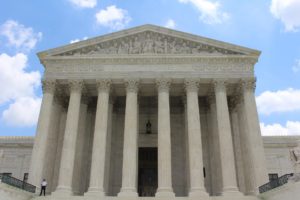Precedent Setting Decisions
- Home
- Precedent Setting Decisions
Precedent Setting Decisions
Milberg’s tireless litigation efforts, which include victories before the United States Supreme Court, have set groundbreaking legal precedents that strengthened plaintiffs’ rights.
-
 See More
See MoreGilead Sciences Securities Litigation
In re Gilead Sciences Securities Litigation, 536 F.3d 1049 (9th Cir. 2008)In this opinion, the Ninth Circuit clarified loss causation pleading requirements. The opinion established that plaintiffs in a securities fraud action may adequately plead loss causation where they provide sufficient detail of their loss causation theory and some assurance that the theory has a basis in fact. -
 See More
See MoreLord Abbett Mutual Funds Fee Litigation
In re Lord Abbett Mutual Funds Fee Litigation, 553 F.3d 248 (3d Cir. 2009)This important decision set significant precedent regarding the scope of preemption under the Securities Litigation Uniform Standards Act of 1998 (“SLUSA”). In reversing the District Court’s dismissal of the plaintiffs’ claims, the Third Circuit held that “SLUSA does not mandate dismissal of an action in its entirety where the action includes only some pre-empted claims.” Under this holding, “any valid federal claims pled in the same action – claims that, if brought independently, would clearly fall outside of SLUSA’s pre-emptive scope – need not also be dismissed.” -
 See More
See MoreMerck & Co., Inc. v. Reynolds
Merck & Co., Inc. v. Reynolds, 130 S. Ct. 1784 (2010)Milberg won a significant victory before the United States Supreme Court, which issued a decision addressing when the two-year statute of limitations for securities fraud claims under 28 U.S.C. § 1658(b) begins to run. The Court rejected the concept of “inquiry notice” and held that the plaintiff must be on actual or constructive notice of “the facts constituting the violation”, including facts concerning the defendants’ scienter, in order to trigger the statute of limitations. This important holding potentially enables plaintiffs to bring claims based on misstatements made beyond the two-year limitations period. -
 See More
See MorePlatinum Partners v. Chicago Board Options Exchange, Inc.
• Platinum Partners v. Chicago Board Options Exchange, Inc., No. 1-11-2903 (Ill. App. Ct. 2012)Milberg represented an investment management group in a case against the Chicago Board Options Exchange, Inc. (“CBOE”) and Options Clearing Corp. (“OCC”). The plaintiff investment management group alleged that it was injured when the CBOE and OCC privately disclosed strike price information to certain insiders prior to the information being made public. In the interim between the private disclosure and the public announcements, the plaintiff purchased tens of thousands of affected options. The lower court dismissed the complaint on the grounds that the CBOE and OCC, as self-regulatory organizations, were immune from suit. However, the Appellate Court reversed, holding that a private disclosure to insiders served no regulatory purpose and should not be protected from suit. The Illinois Supreme Court declined the defendants’ petition for leave to appeal -
 See More
See MoreRifkin v. Crow
Rifkin v. Crow, 574 F.2d 256 (5th Cir. 1978)The Fifth Circuit reversed the District Court’s summary judgment order dismissing plaintiffs’ claims for failure to prove reliance, paving the way for the Fifth Circuit’s future acceptance of the “fraud-on-the-market” rationale.
